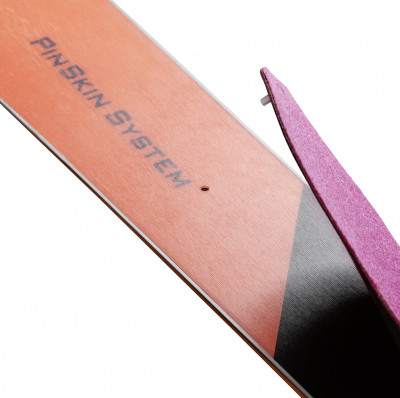Dynafit Blacklight Pro Ski
One of Dynafit's favorite contestants in the elite world of the sub-1000-gram ski is the Blacklight Pro, which they claim is made especially for "professional mountaineers." Whether you make a life, or a living, out of your time in thin air and wind-scoured snow, the Blacklight Pro could be the ski that takes you to the next level of professional development. Coming in at only 200 grams heavier than many skimo race skis, but with the width and rocker to float confidently in dense powder and chalky couloirs, the Blacklight Pro puts an end to the idea that low-fat skis can't be versatile. A generous 116mm tip width (172cm length) and snappy 18.5m turn radius might tempt you to ski the Blacklight Pro as you would your powder boards, but when the good conditions stop and refrozen mank comes into view, don't be alarmed -- the unidirectional carbon layup and snappy paulownia core will keep your edging on-point and your hop-turning predictable. Early adopters will be interested in Dynafit's Pin-Skin System, exclusive to the Blacklight Pro, which uses a small-diameter hole in the base of the ski as a rear skin fix. Instead of a traditional tail clip, which is heavy and bulky by comparison, the proprietary skin from Dynafit will include a small pin at the rear of the plush that inserts into the pinhole attachment, making the skin as light and packable as a race skin, but with the added security of affixing to the ski base. Whether long ski tours have taken over your weeks or just your weekends, the Blacklight Pro is the ski to take along.
- 3D Sidewall/Cap Construction marries the low weight of a cap ski with the durability and strength of a partial sidewall.
- Unidirectional carbon layup is lighter than previous Dynafit iterations, but with a friendlier feel in choppy snow.
- Blend of rocker (20-25%) and camber (75-80%) might just trick you into believing you're on a powder ski without the unnecessary girth.
- Exclusive Pin-Skin System combines the lightweight and fast gliding of a race skin with the security of traditional, tail-fixed skins.
Update 2022/23: Dynafit gave these skis some slick new topsheet colors.
Update 2025/26: Another spiffy topsheet update... but diagonal this time!
| Specifications | |
| Length(s) cm | 158, 165, 172, 178 |
|
Weight |
855g [158] 920g [165] 985g [172] 1020g [178] |
| Weight (pair) | 1710g [158] 1840g [165] 1970g [172] 2040g [178] |
|
|
114-78-98 [158] 115-79-99 [165] 116-80-100 [172] 117-81-101 [178] |
|
Turn |
15.5m [158] 17.0m [165] 18.5m [172] 20.0m [178] |
|
Skin |
Pin Skin System |
| Specs Verified | Yes |
| Design | |
|
|
Light tip & tail rocker, camber underfoot |
|
|
Tapered tip & tail, medium radius |
|
|
3D sidewall cap |
|
|
Paulownia Race Core |
| Skimo Co Says | |
| Usage | Speed touring, mountaineering, casual racing |
| Notes | Awesome Pin-Skin connection system |
| Bottom Line | Dynafit's best ski yet |
| Compare to other Low-fat Skis | |
Related Products
Questions & Reviews
I'm 170lbs, 6'2". Will be using this ski for firm snow in the Sierras.
Thanks
As a professional user I have boots in two sizes, one for actual skiing and a larger for work. 8mm difference in BSL.
Will optimise for my "skiing boot" with shorter BSL but ideally would like to find a good middle ground. My initial thought is that this ski needs to be mounted a bit rearward and skied with forward pressure.
Any advice regarding the mounting?
6'2" 175lbs
expert skier
I will take these out in the sierras for big outings and be skiing lots of firm snow in consequential terrain.
Thanks!
The Superlight 150 is a good match and looks awesome.
You can fill out our Binding Finder for more choices.
The Blacklight Pro is a good choice for fitness and ski mountaineering! Being on the heavier side is no problem for this ski. It is a very stiff ski, so it is not really very forgiving. It is a good choice for people who will mostly be on firm snow, or maybe on some softer but still consistent snow. It gets a bit more punishing if the snow is variable/choppy/uneven, and will demand a very strong technique in those conditions. That said, it has great edge hold and is damp for a ski of its weight. A great ski mountaineering and speed touring option!
The Salomon Summit 79 would be a great option in the same category that would have a different personality - more forgiving, easier to turn, and probably more fun in variable and softer snow. The Blacklight Pro would have the edge in steep and firm conditions, where the stiff flex and long effective edge will make it very powerful and stable.
Since so far no one has reviewed the pin-system skins on here, I'll save you from clicking over to the skins to read my review of them: These [pomoca/dynafit pin skins] came with my Blacklight Pros, and I've used them in all my local races this season, including the PowderKeg. I've raced with them in through everything from powder to sub zero temps to corn, and can say they are sweet skins. Great grip, great glide, and seem to stay on better than most race skins, even in the cold (I assume thanks to the pin system). I will say the pin does pose a challenge when ripping them off, I usually have to rip the skin as off as I can, then slide my hand down and grip it close to the pin, and then pull directly out. With some practice, it only adds about 2-3 seconds to my transitions, which is a great trade for not having skin problems on the ups, but I've known a few people who chop off the pin to save those seconds which is probably worth it for the fair weather days.
Firstly, to go into more detail, shoot us an email at help@skimo.co!
The Blacklight Pro is fairly stiff and will hold an edge very well in steeps. The Zero G 80 LT is similar, but is softer at the tip and tail, making it a bit more friendly while keeping the supportive stiffness. The Zero G 85 is stiff throughout, which can lead to it bouncing off of crud. In hardpack and corn it's a blast, and it'll also hold an edge well in steeps. Another option to consider is the Ski Trab Maestro 2. Similar to the Zero G 80 LT, it's softer at the tip and tail, which makes it easier to ski, but supportive and powerful.
I'm looking for a light, ascent oriented ski. Blacklight pros sound like a good option, but what the "proffesional" tag to this ski is worrisome to me, as I'm not a very skilled or confident skier. I have the same problem with a lot of other skis in this category, namely Ski trab Magico/Ortles. So, how good of a skier do I need to be to use these "higher level" skis?
I've also never tried skis this narrow and I will use them for approach with a heavier pack. Is 80mm too narrow?
Thank you.
The Blacklight Pro is a fairly stiff ski, which makes it a blast on the downs, but can be a bit difficult for a less confident skier. 80mm is a good do-it-all width for approaches and light touring. For a more friendly ski, check out the Backland UL 78.
I'm an athletic 230lb and gravitate toward burlier skis in most other weightclasses (OG volkl Katana, Mantra 102, etc) and have really liked my salomon minim skimo skis. Wondering if the combo of super light and super stiff in the BL pro's is a recipe for jittery and unskiable?
Was considering BL pros in a 178cm.
Cheers,
Brendan
I wouldn't expect much of a durability difference as we haven't seen or heard of any issues unique to the Pro version. The biggest difference is that the Blacklight 80 will be a touch softer and more forgiving than the lighter Pro version. We only carry the Pro because we find that it skis exceedingly well without needing the somewhat heavier Blacklight construction that the 80 has.
Great skis to have on your radar! My comparison is below:
Both these skis are pretty stiff, and will hold an edge in firm snow. Also, the weight is near enough as to not really matter. I will start the Blacklight Pro. This ski has a surprisingly fat shovel for the waist width, which makes it well equipped for the errant spring powder day. Also, the pin skin system is pretty slick if you want to keep friction low on the skin track without sacrificing a solid tail attachment. This ski is well suited to spring and all things ski mountaineering. It requires some input from the skier, but is super versatile.
On to the Ski Trab Maestro.2. Built to last, this ski will thrive in anything from firm conditions in the morning, to corn in the afternoon. Also requiring some input from the skier, the Maestro is full of energy, and is a great option for speed touring, or occasions when the grams really count.
As a self described aggressive skier, I think you are completely on the right track with your considerations.
For further questions on ski mountaineering setups, feel free to reach out to help@skimo.co!
How do these compare to the Atomic Backland 85 UL in terms of downhill performance?
Great question, the skis are pretty similar, though there a couple differences. The Backland has a softer flex and the "HRZN Tech Tip" which helps to provide more float in soft snow and powder. On the other hand, the Blacklight's longer turn radius and camber yield excellent edge hold on steep and hard snow, making it an excellent ski for mountaineering or volcanoes. As far as how they ski, the Blacklight likes to be skied powerfully and deliberately and prefers a more aggressive skiing style, and it will handle better at high speeds. The Backlands are a bit more playful and can be skied in a more relaxed stance without needing to power the tips on each turn, but will have a slightly harder time keeping an edge on hard and frozen snow.
Earn store credit by writing reviews. Learn more.


























